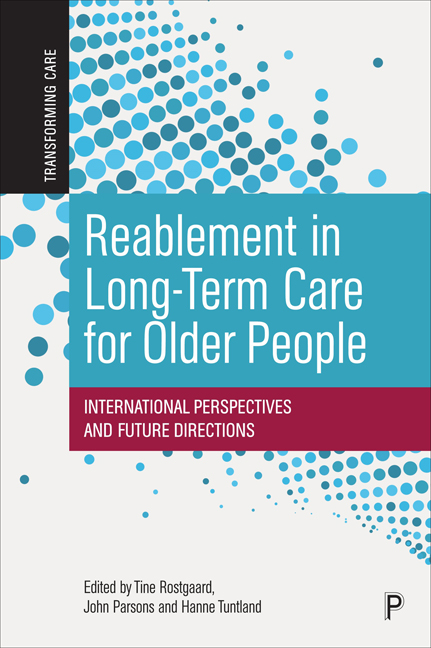1 - Introduction: The concept, rationale, and implications of reablement
Published online by Cambridge University Press: 18 January 2024
Summary
The aim of the book
With ageing societies, we need to identify sustainable and person-centred solutions for supporting frail older people at home and in ways that improve their quality of life and longevity. There is also a need for innovative and integrative approaches to health and long-term care that are cost-effective and ensure the ageing individual receives individually tailored assistance. Reablement may be an appropriate response to these challenges. It is a radically different approach to home care for older people, seeking to help them to regain and maintain their functional ability and independence, in contrast to more passively providing help and assistance, which has been the traditional approach in compensatory home care (Aspinal et al, 2016; Cochrane et al, 2016). Thus, reablement may be a more sustainable solution for nation-states, municipalities, and service providers to address the needs of an ageing population. Reablement's integrative approach may also help counter the expected increase in public spending on health and long-term care, which is expected to double in the OECD countries by 2060 (de la Maisonneuve and Martins, 2015). However, reablement also implies a new approach to ageing and the provision of social care, which has implications for individuals and their families, as well as for practitioners with regards to new roles, collaborations, needs fulfillment, and obligations. This is why a critical investigation of reablement is needed.
There is already wide and global interest in reablement from policy makers, practitioners, and the academic community. However, since reablement is a relatively new and unexplored approach, research into reablement models and their outcomes has been scarce, uncoordinated, and lacking focus, both nationally and internationally (Legg et al, 2016; Pettersson and Iwarsson, 2017; Clotworthy et al, 2021). In order to bring the research forward and to facilitate theorisation and learning across countries, this book provides an interdisciplinary, comparative, and critical investigation of reablement. Based on collaborations within an international and interdisciplinary research network of reablement researchers, ReAble (https://reable.auckland.ac.nz/), we now take the opportunity to coherently address what reablement is, and what its implications may be on both an individual and societal level.
- Type
- Chapter
- Information
- Reablement in Long-term Care for Older PeopleInternational Perspectives and Future Directions, pp. 3 - 20Publisher: Bristol University PressPrint publication year: 2023



